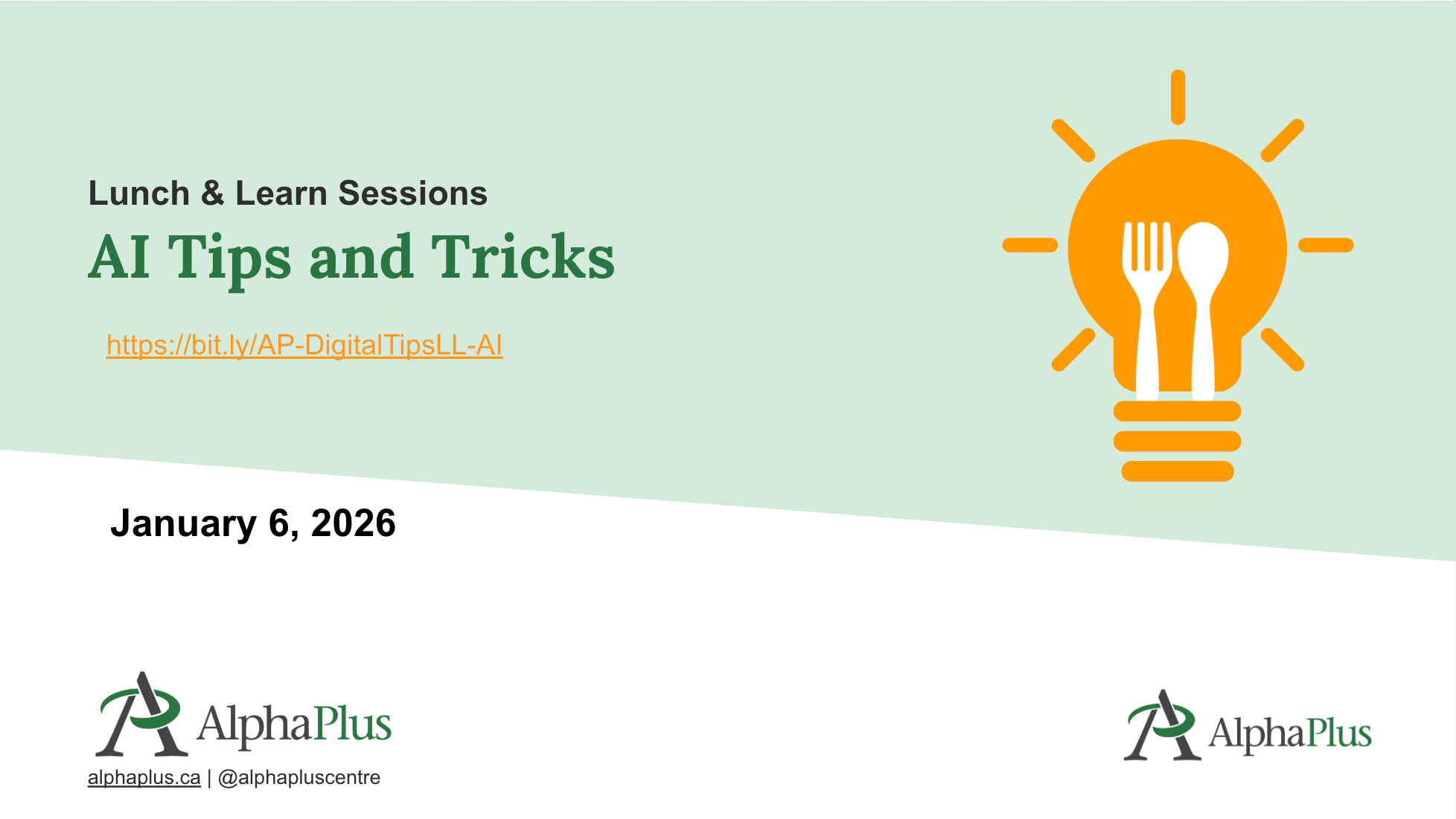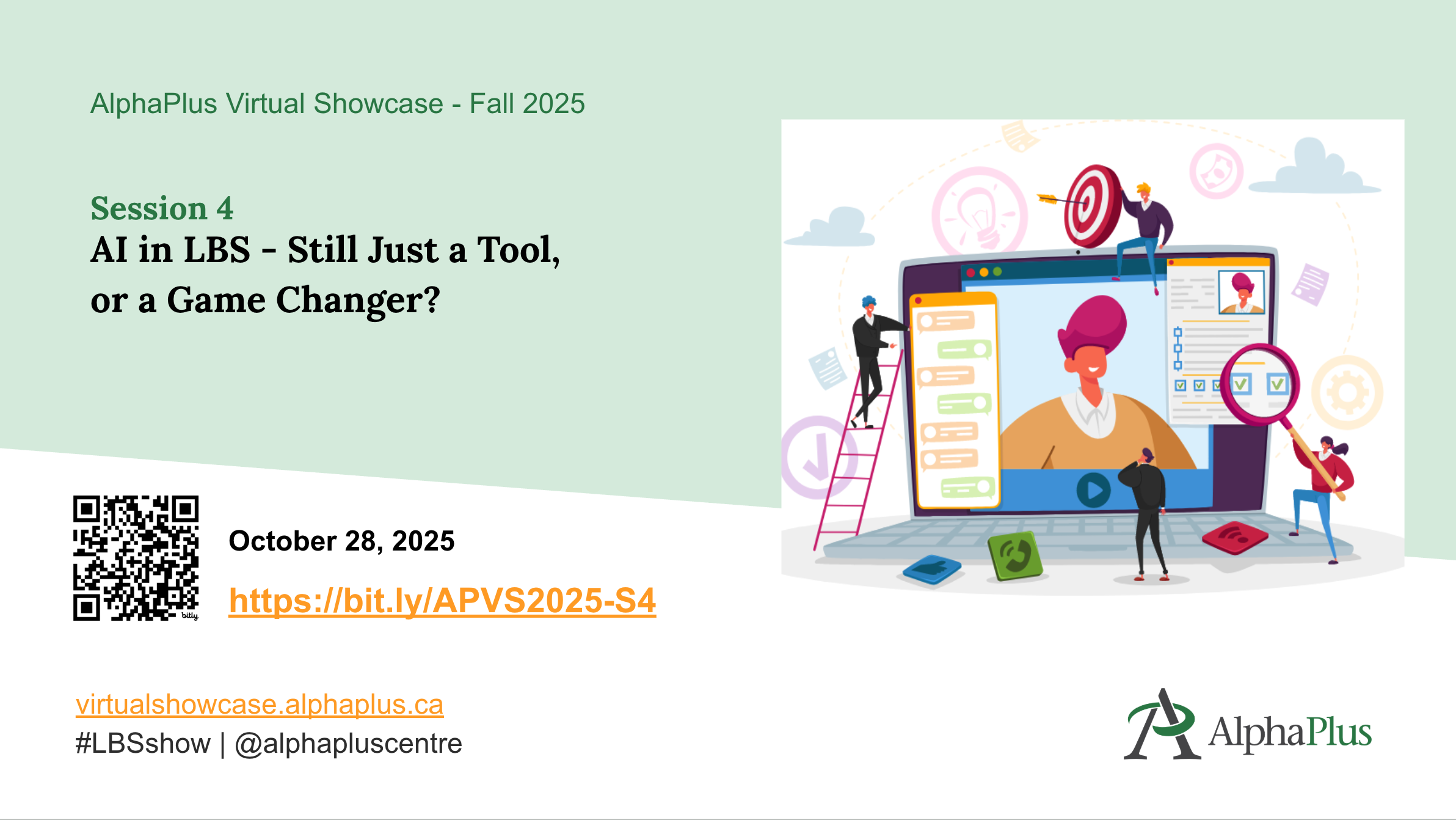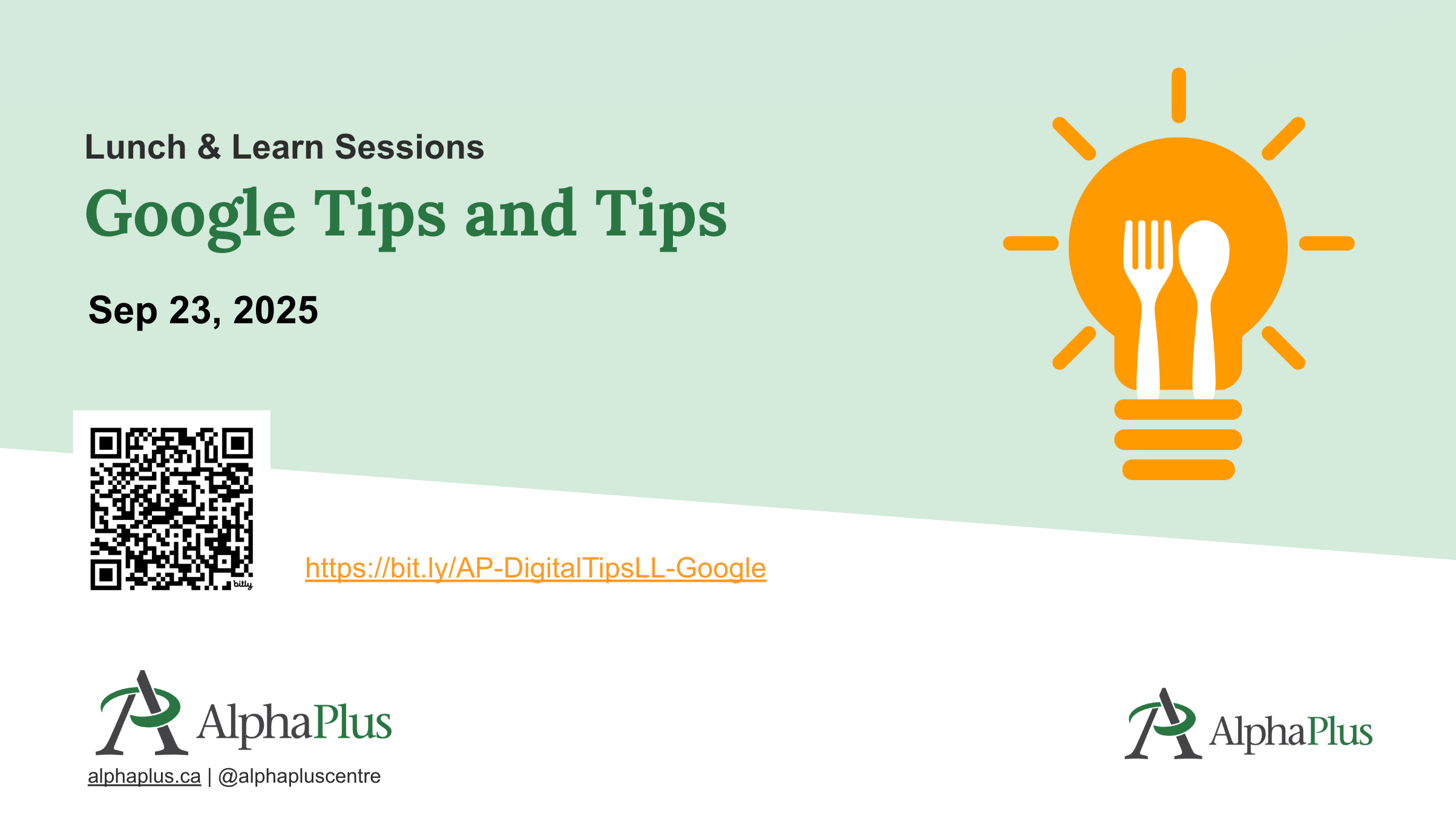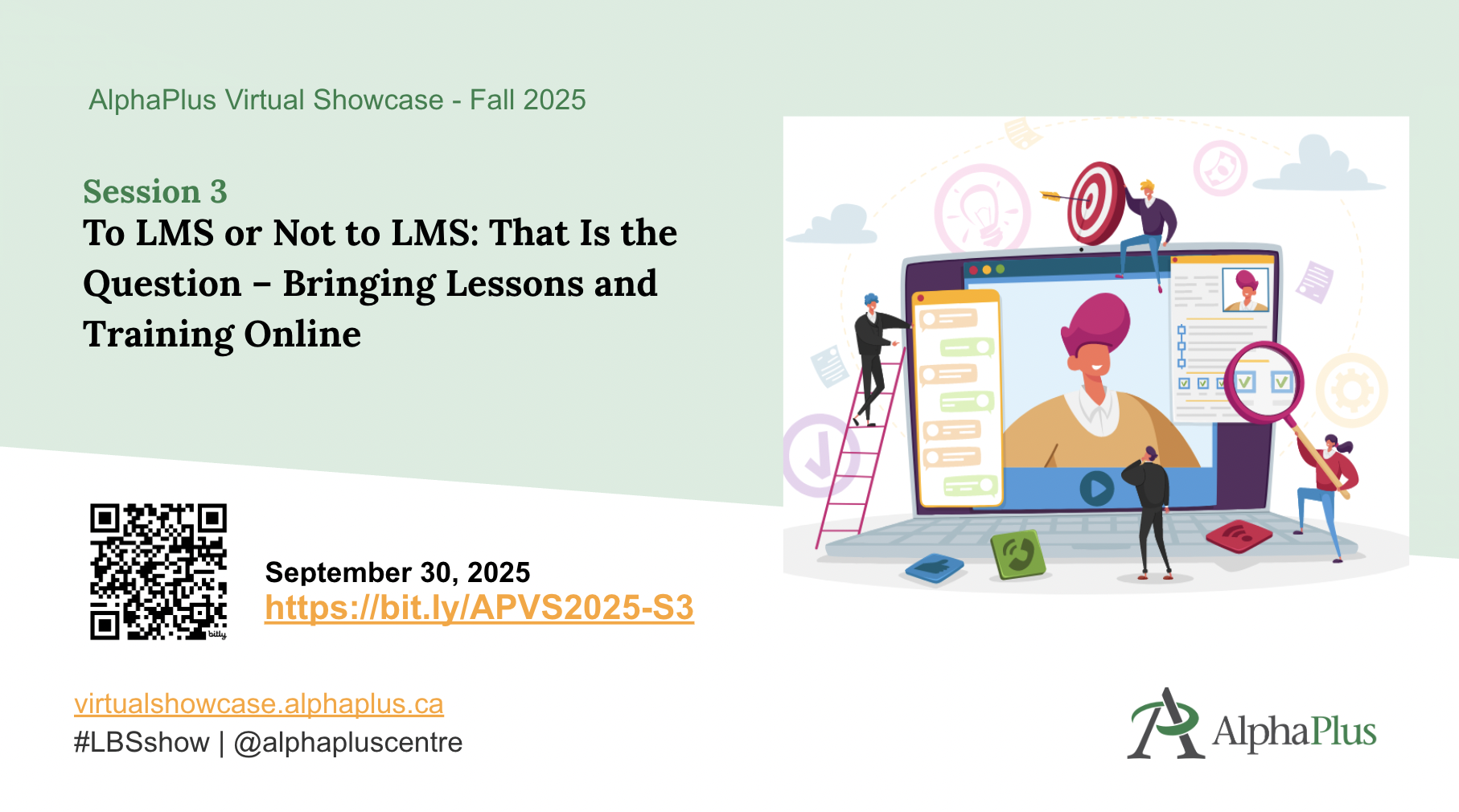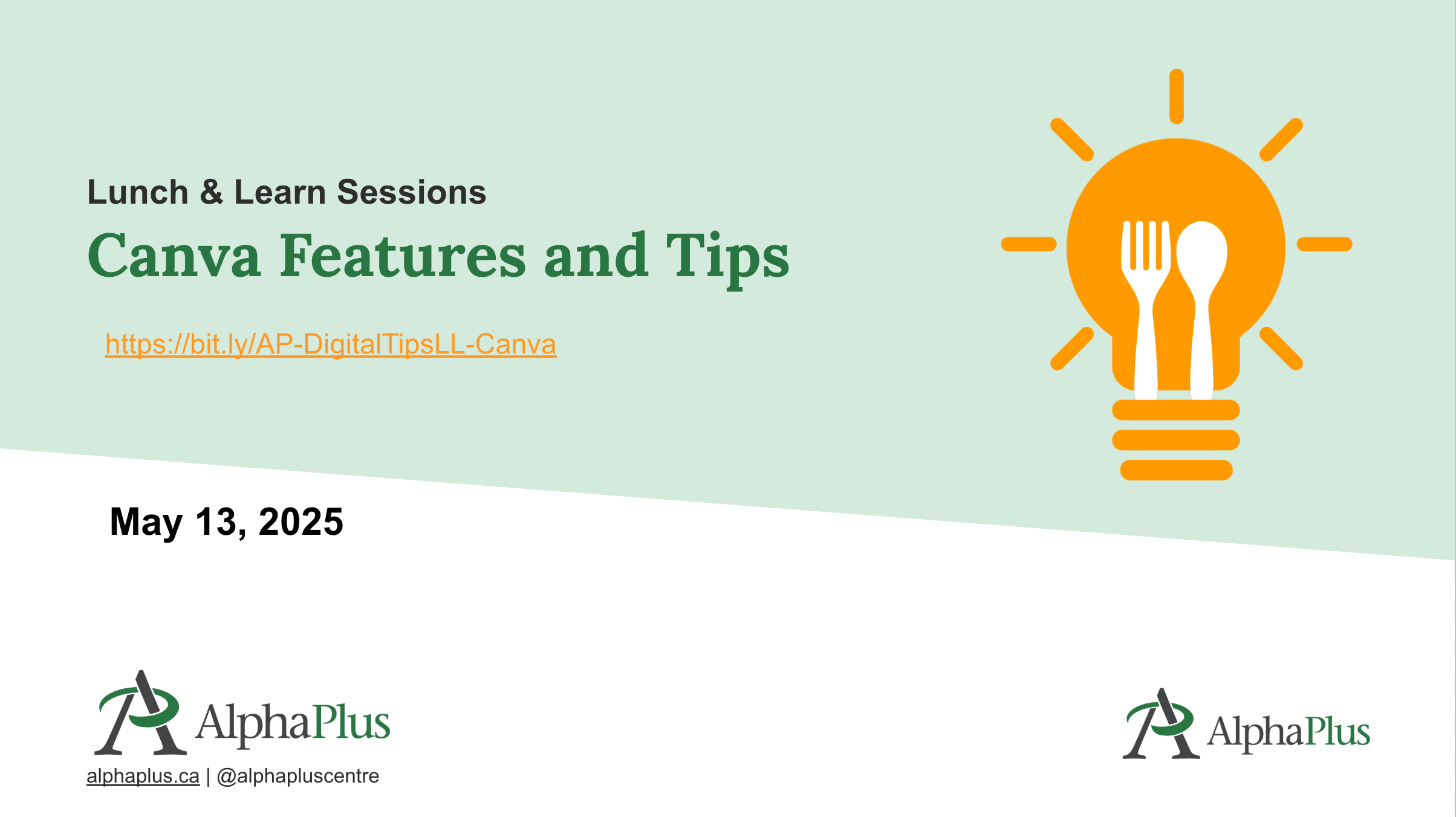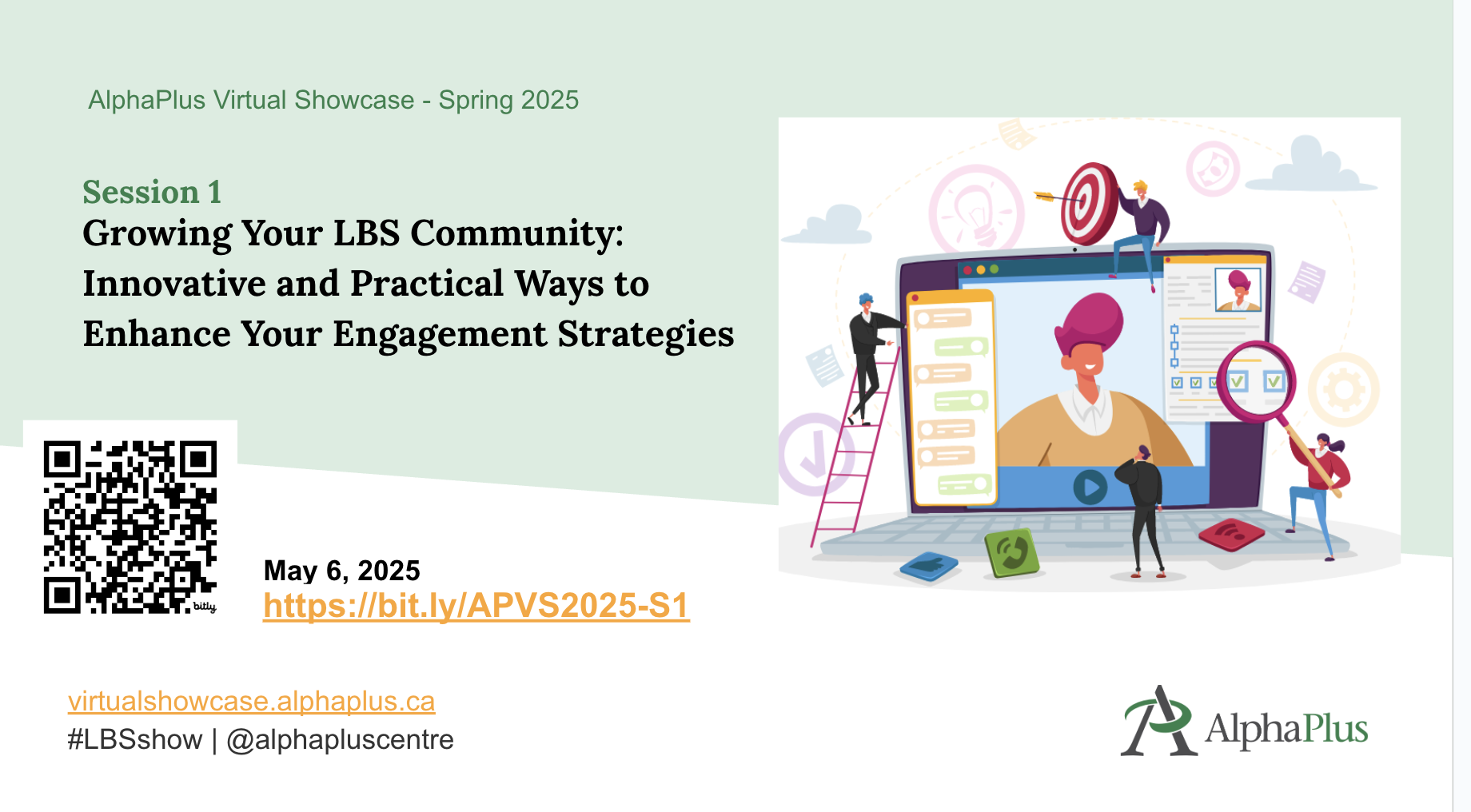Delivered on Tuesday, October 28, 2025
Artificial Intelligence (AI) has evolved significantly since we first explored its potential in Literacy and Basic Skills (LBS) programs a year ago. With new tools emerging and existing ones becoming more sophisticated, the ways we use AI have also transformed. So, what’s happening now?
During the session, guests from the literacy community shared how they actively integrate AI into their programs. From prompt engineering to creating graphics and videos, to developing training materials, we dove into how AI is reshaping our work—and what that means for educators, staff, and learners alike.
ASL interpretation was be provided.
PRESENTATION SLIDES
VIDEO RECORDING
NOTE: VIDEO WITH ASL INTERPRETATION COMING SOON
ADDITIONAL RESOURCES
PRESENTERS

Lisa McArthur has been working as an adult educator since 2003 in a variety of capacities. They include, but are not limited to, being a certified educational skills assessor, a family literacy facilitator and certified Clear Writing consultant. Lisa has sat on a number of community advisory committees and has evaluated numerous literacy projects.

Ryan Pike is an adult literacy instructor who has taught at the Labour Education Centre in Toronto for 11 years. He also worked with Metro Toronto Movement for Literacy (MTML) on the Smartphones and Employment Skills project, helping to design learning tools that support adults using smartphones for work. He’s passionate about making technology feel less intimidating and more empowering for adult learners. Ryan enjoys experimenting with different digital tools and approaches to create engaging, interactive resources that make learning accessible and enjoyable for everyone.

Richard has dedicated 21 years to the Toronto District School Board, currently working at the Mimico Adult Centre. His work focuses on providing literacy education to adults seeking academic upgrading, as well as supporting individuals with special needs. Through instruction in English, math, and digital learning, Richard empowers learners to achieve greater independence and pursue their personal and educational goals
Explore the The Virtual Showcase Collection to see what happened in past sessions.
This session, delivered on September 23, 2025, focused on the latest features in Google Workspace. We explored Google Vids, learned about new building blocks in Docs and Slides, set up appointment schedules in Calendar, and dove into activity notifications, smart chips in Docs, disabling autosave in Forms, AI in Google Search, and more.
PRESENTATION SLIDES
VIDEO RECORDING
Delivered on Tuesday, September 30, 2025
The COVID-19 pandemic pushed many literacy programs to rapidly shift their lessons and training into online environments, sparking a surge in interest around Learning Management Systems (LMS). But where do we stand now?
During the session guests from the literacy community shared the tools and platforms that have helped them make their content accessible to learners, tutors, and staff, discussed what’s worked (and what hasn’t), and offered practical tips and insights for programs considering—or reconsidering—their digital strategy.
PRESENTATION SLIDES
VIDEO RECORDINGS
In English, Speaker view only.
With ASL interpretation
PRESENTERS

Randie is a Program Manager for Almaguin Adult Learning Centre (AALC), a community based LBS agency with 3 centres serving 17 small communities across the Almaguin Highlands. She joined AALC in 2010 as a literacy instructor and has been committed to life long learning and meeting learners where they are for the last 15 years.

Lisa McArthur has been working as an adult educator since 2003 in a variety of capacities. They include, but are not limited to, being a certified educational skills assessor, a family literacy facilitator and certified Clear Writing consultant. Lisa has sat on a number of community advisory committees and has evaluated numerous literacy projects.

Stephanie has been teaching in post-secondary and Academic Upgrading for close to 15 years. She has a Master of Science, a Bachelor of Education and is a member of the Ontario College of Teachers. She is an avid curriculum developer for online, hybrid and in person courses in all subject areas.

Lea Roque is a passionate educator and early adopter of technology, with a strong background in adult education, engineering design, and tech training. She specializes in designing engaging, learner-centered curriculum and has taught in LBS, post-secondary, and corporate settings. Known for her supportive approach and enthusiasm for digital skill-building, Lea thrives on helping learners reach their “Aha!” moments that spark confidence and curiosity.

Althea Balmes (she/ they) co-creates in person and digital projects at the intersection of visual storytelling, UX design and learner-centered education. Althea has a background in community adult literacy previously working at Parkdale Project Read and with West TO Collaborative, a collective of five different adult literacy organizations across Toronto west end providing tutor training program.
www.altheabalmes.com
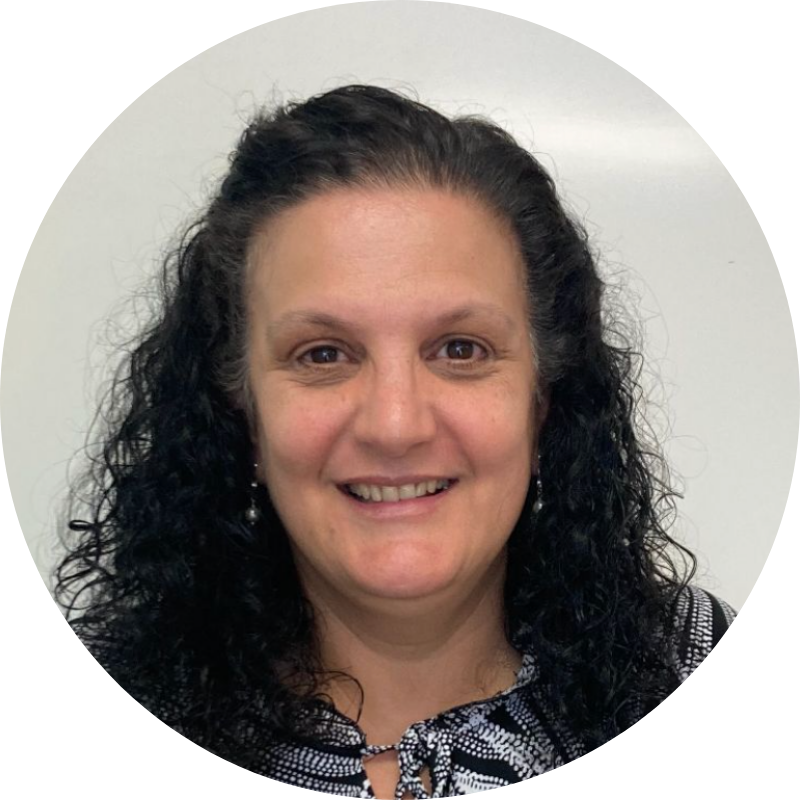
Tina is the LBS Lead Instructor at Niagara Catholic District School Board. She is involved in classroom/hybrid teaching and administrative duties at St. Catharines & Niagara Falls locations.
Explore the The Virtual Showcase Collection to see what happened in past sessions.
Our idea that literacy workers might be interested in AI policies and guidelines came from a question that a literacy instructor asked in an Ai for Educators workshop, “I showed a learner how to use AI to get help on a simple task. Now that learner is using AI for everything. I feel that this is hindering them in developing some skills that they will need. How can I get them to stop?”
The facilitator, Shawn McCusker, suggested, “Work with the learner to create guidelines that work for you and that specific learner or group of learners in the specific contexts where they are learning.”
We thought this made sense. AI is so new that there are no great templates for the use of AI in adult literacy classrooms. Literacy instructors work with learners to create guidelines for the ways they will work together and are used to facilitating this process.
Here are three workshops presented by AlphaPlus where we discussed the topic of how to create a set of classroom AI guidelines to determine ways teachers and learners can use AI to support teaching and learning in specific contexts. We kicked off the conversation at a Showcase and took a deeper dive into the particulars and how tos in a series of workshops.
To see more about using AI in educational settings, check out our What is Generative AI? resource.
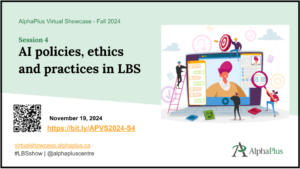
Virtual Showcase: AI policies, ethics and practices in LBS
“In this Showcase, three guest presenters plus three AlphaPlus staff members (Alan, Guylaine and Tracey) discussed how they are integrating AI into their practice and how they are thinking about AI policies and guidelines for organizations and for classrooms.” (November 2024)
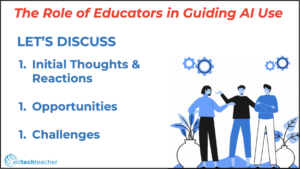
Creating AI Policy with Learners
“This three-workshop series, facilitated by Tom Driscoll, is about what an AI policy for adult learners in literacy could look like. We will look at how to work with learners to create a policy that offers guidance for using AI ethically and safely to do research, make material more accessible and support creativity, communication and collaboration.” On the Padlet board, you can see how literacy instructors responded to the scenarios with thoughtful and well reasoned ideas about when using AI can support learning and when it can hinder developing certain skills and knowledge. (January 2025)
- Workshop 1 Slides and Recording
- Workshop 2 Slides and Recording
- Workshop 3 Slides and Recording and Padlet
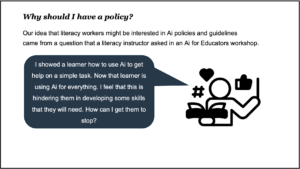
AI Policy for Literacy Practitioners and Learners
AlphaPlus was invited by Calgary Learns to expand on part of what we presented at the November 2024 Showcase. Guylaine and Tracey facilitated the discussion. “Generative Ai for teaching and learning is still a relatively new technology. In this workshop, facilitated by AlphaPlus practitioners, we will discuss the why and when of using generative Ai tools in adult education classrooms. As the technology and our practices evolve, so do our questions. We will share some of the questions we have been grappling with and invite participants to add theirs to the conversation.” The stoplight discussion is one way to start the conversation about AI use with colleagues and learners. (Calgary Learns, April 2025)
Stoplight Discussion Template
This session, delivered on May 13, 2025, focused on how to create Canva designs from scratch—be it presentations, flyers, or social media posts, building your brand kit with preferred fonts and logos, inviting team members, sharing designs, and leveraging templates, AI tools, and advanced editing features such as background removal.
PRESENTATION SLIDES
VIDEO RECORDING
This session, delivered on April 8, 2025, focused on learning how to update your Zoom desktop client, use the AI companion, manage captions and transcripts, and explore features like reactions, spotlight, meeting timers, whiteboard, sharing layouts, settings, Zoom Apps, and more.
PRESENTATION SLIDES
VIDEO RECORDING
Delivered on Tuesaday, June 3, 2025
With high turnover, effective succession, contingency and onboarding documentation/planning are crucial for the sustainability and resilience of LBS programs.
During the session, guests from the literacy community discussed what they have been doing and shared tools and examples to help participants develop practical file management systems, documentation and plans to ensure smoother operations, staff transitions and the continuity of programs in the face of unexpected challenges.
Insightful tips and best practices were shared to help participants create robust organizational documentation/plans and processes, and provide space to share various examples and ideas.
PRESENTATION SLIDES

VIDEO RECORDING
SHARED RESOURCES
Orientation to Literacy and Basic Skills for Regional Literacy Networks from Literacy Link Eastern Ontario
Hiring in Adult Training from Learning Ontario Central South
Human Resources and Succession Planning Toolkits
Living Manual Example (Google Doc)
Living Manual Example (Force Copy)
PRESENTERS
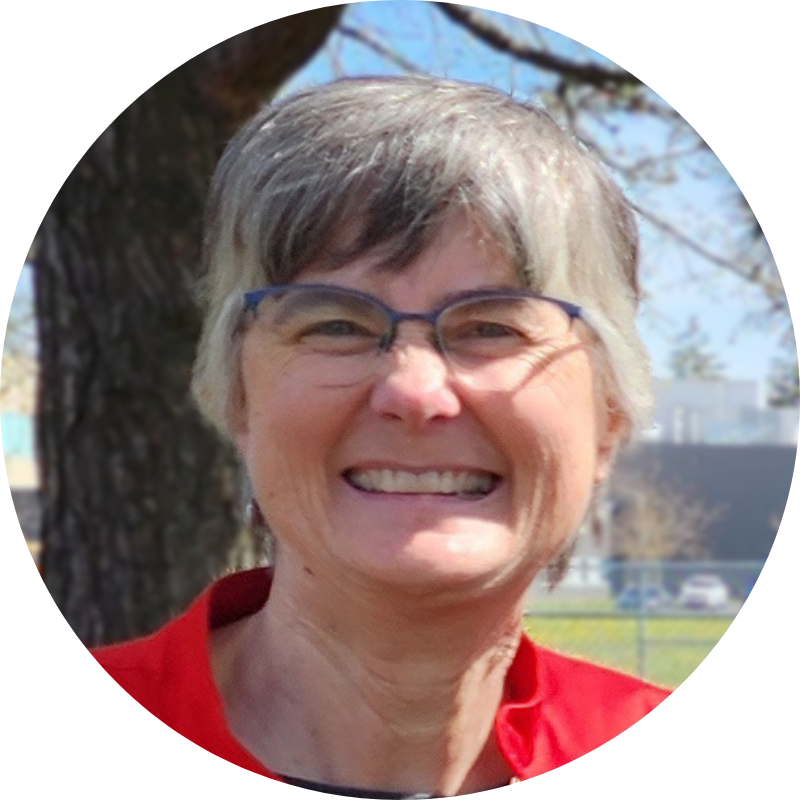
Carrie Wakeford has been the Executive Director of Learning Ontario Central South (LOCS) for the past 5 years. Prior to coming to LOCS, Carrie was self employed designing and facilitating in person and online training. She also completed research and managed projects for the ministry and for LBS, employment organizations and the Workforce Development Board. Carrie also provided individual career counselling and taught in the Career Development Practitioner program at Conestoga College. In 2019 Carrie won the ‘Outstanding Career Professional Award’ with Career Professionals of Canada. Prior to that she worked in computer training and she managed an employment counselling organization.

Brandy is the Executive Director at Literacy Link Eastern Ontario (LLEO) and she still considers herself new in this position after 2 years. Brandy joined the literacy field after working in libraries for many years including Kingston Frontenac Public Library, Queen’s University Teacher Resource Centre and Brockville Public Library. Brandy is dedicated to social justice, equity, diversity and inclusion. She has received an Ally Award for her work with Brockville Pride and recognition from the Every Kid in Our Community committee as a Youth Asset Builder. She enjoys spending time with her family and cats, and reading is her sport.

Melanie is the Program Coordinator and Academic Advisor for Academic Upgrading at Algonquin College Pembroke Campus. She has worked in various spaces including twenty years in early literacy, 5 years in Employment Services and Ontario Works and the last 5 years in Academic Upgrading. If not spending time in nature with her partner, Josh, she is probably training her cats to walk on a leash … yes, really. Melanie believes that, like chefs, ‘slow is smooth and smooth is fast’ (Work Clean by Dan Charnas) and works to bring processes that will create smoothness for all team members into her daily work.

Alan has been the Executive Director of AlphaPlus since 2015, but his involvement with the organization dates to its founding. As a leader in the literacy field with comprehensive knowledge of the affordances and limitations of educational and administrative uses of technology, Alan advances an understanding of information literacy and blended learning that moves the field forward. He guides the team’s work with adult learning programs to understand, research, plan and integrate emerging digital tools to meet the needs of staff and learners effectively and creatively.
Bio coming soon.
In today’s digital age, building and nurturing a vibrant community is essential for the success of our LBS programs.
In this Showcase, delivered on May 6, 2025, guests presenters from St. Albert Learning Centre in Sudbury and Metro Toronto Movement for Literacy, discussed how they leverage innovative marketing campaigns, podcasts, videos, and other engagement strategies to grow their client base and community connections.
They shared insightful tips and best practices that will help you create lasting connections with your clients and partners.
PRESENTATION SLIDES
VIDEO RECORDING
PRESENTERS

Ambreen has 20 years of experience in the education field. Possessing a Masters in English Literature and in Educational Planning and Management, she has maintained successful positions as a Vice Principal, English Language Instructor, Manager HR, Communication Executive and Literacy practitioner.
Currently, she is working as an Executive Director at Metro Toronto Movement for Literacy, a non-profit organization that supports adult literacy in Toronto and York Region. Her previous work experience and life-long learning certificates and diplomas bring a wealth of information to develop learning strategies, recruitment procedures and governance.
Her dedication and determination in helping individuals grow and develop are highlighted in all her professional achievements. She is also passionate about volunteering and has been an ardent volunteer in many non-profits across GTA. She loves to cook and paint in her free time.

Susan has been active in adult education since 1986 across a variety of roles and has developed a broad and deep understanding of the field. She has worked as a literacy and basic skills (LBS) assessor, instructor and LBS manager for the Toronto District School Board, and as an assessor and LBS instructor for the Toronto Catholic District School Board.
As a past Vice President on the board of directors, Susan helped the Metro Toronto Movement for Literacy dramatically improve its visibility and the services it provides to the adult education sector.
Susan has developed numerous LBS resources. These include learning resources for Community Legal Education Ontario and a comprehensive Zoom manual for adult educators that’s now being used across Toronto as well as other regions across the province. She has also trained more than 200 LBS, language instruction for newcomers to Canada (LINC) and English as a second language (ESL) instructors on how to use Zoom in the classroom.

Christina brings over 25 years of experience in education and currently serves on the Board of Directors for CESBA, the Ontario Association of Adult and Continuing Education School Board Administrators while also in her fourth year as principal of St. Albert Learning Centre in Sudbury, an adult and alternative education school that offers innovative, community-driven programming for learners of all ages.
Throughout her career, Christina has focused on Special Education and Experiential Learning, primarily as a consultant for the Sudbury Catholic District School Board. Her deep understanding of student needs and commitment to inclusive education inform her work in adult learning and literacy.
Christina’s entrepreneurial spirit has fueled the growth of a student-led business at St. Albert Learning Centre where learners earn secondary school credits while creating and selling handcrafted items. Profits support charitable projects through a parish partnership. This initiative recently earned first place and the national title of Canadian School of the Future in an Innovation Challenge, along with the prestigious Michael Monk Award for service-learning.
